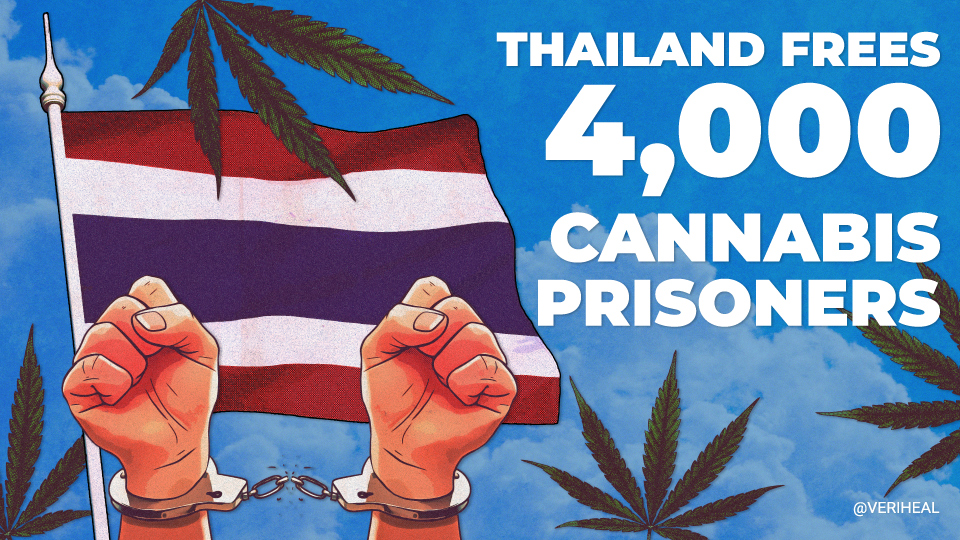Thailand left its war on drugs in the past, the Texas GOP platform raised some questions, and a new study revealed how cannabis legalization affects road safety.
Let’s dive into this week’s cannanews.
Thailand’s Cannabis Turn-Around
Though it’s now home to one of the most progressive cannabis policies on the planet, a look back at Thailand’s recent history reveals just how far the nation has come.
In 2001, Thai voters elected Thaksin Shinawatra as their new prime minister due in large part to his popular “war on drugs” platform. Shinawatra’s platform resonated with locals who were fearful of the effects that narcotics would have on their communities. Once in office, Shinawatra waged a ruthless anti-drug campaign, executing hundreds of drug offense suspects in the process.
Thailand’s history of brutal drug policies is part of what makes the country’s recent transformation all the more surprising. Take a walk down a street in the country today, and you are likely to encounter various shops and stands selling every cannabis product you can imagine. You may even find yourself sampling some delicious cannabis-infused curry along the way.
Thailand’s drastic drug policy change is all part of Minister of Public Health Anutin Charnvirakul’s plan to usher in a new era of prosperity for the tourism-dependent country. Early estimates show that cannabis businesses in the country could generate up to $10 billion in just the first three years of legalization alone. This massive figure doesn’t even account for cannabis tourism’s effect on cannabis-adjacent and non-cannabis businesses in the country, either!
Beyond profit, Thailand’s new approach to cannabis is also bringing some much-needed criminal justice reform. Since legalization, over 4,000 prisoners with cannabis-related charges have been freed.
The Thai government is now working on drafting additional regulations and restrictions around its new cannabis industry. While there is little information about what legislators are specifically considering, locals have voiced their opinions that recreational use statutes, business license requirements, and age restrictions should be among the additions.
What do you think about Thailand’s radical drug policy change? What additional regulations do you think Thai legislators should consider? Let us know in the comments!
Texas Republicans Unveil Drug Policy Platform
Over the weekend, Texas’ Republican Party unveiled its new platform. Upon its release, the platform received backlash over its calls for anti-LGBTQ+ legislation and the defunding of public schools. Lost in the outrage over the platform’s extreme planks, however, are the similarly head-scratching drug policy positions the party has chosen to endorse.
For one, the platform reveals that the party plans to oppose any policy related to harm reduction, like syringe exchange programs. Instead, the party plans to push for more “faith-based” rehabilitation. Texas Republicans will also be looking to require welfare recipients to take drug tests before receiving their benefits.
Even more puzzling is the party’s platform plank opposing the legalization of marijuana. The Republican Party’s stance comes at a time when a growing number of individuals in the state are calling for the legalization of medical (83% support) and recreational (60% support) cannabis.
Interestingly enough, the Texas GOP’s platform does call for cannabis action on the federal level. Specifically, the platform plank calls for Congress to move cannabis from the Schedule I list over to the Schedule II list.
What do you think of the Texas Republican Party’s drug policy platform? Let us know in the comments!
Study Finds Cannabis Legalization Increases Road Safety
One of the most common arguments against cannabis legalization is that it could lead to a massive uptick in impaired drivers on the road. According to a new study, however, this age-old talking point may not be as accurate as once thought.
The study was published in the journal Health Economics earlier this month. It looked at car insurance data from 2014 to 2019 to see how medical cannabis legalization affected premium prices. The study found that premiums dropped by about $22 dollars a year following the enactment of medical cannabis measures.
While $22 a year may not seem like much, the figure adds up to around $1.5 billion in savings in states that had legal cannabis from 2014 to 2019. Better yet, the study predicts that these states could see another $900 million in savings in the coming years.
Beyond insurance costs, the study also found a significant drop in health expenditures from car accidents following legalization. Specifically, the study found that legal medical states saved close to $820 million in health expenditures.
Researchers theorize that these savings in insurance premiums and health expenditures are due to the substitution effect—individuals switching from alcohol to cannabis. “The main takeaway is that, even though driving while high is dangerous, medical cannabis legalization can actually make the road safer by reducing the prevalence of drunk driving enough to outweigh it,” said the study’s co-author, Cameron Ellis.
Want to learn more about how cannabis affects road safety? Check out this post about a recent study that determined the window of time you should refrain from driving after consuming cannabis.
Author, Share & Comments









